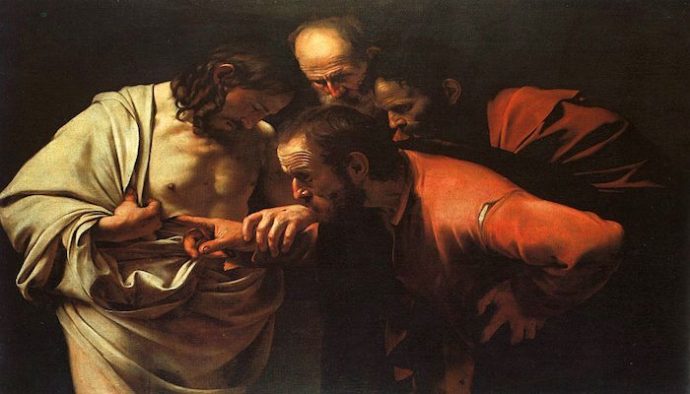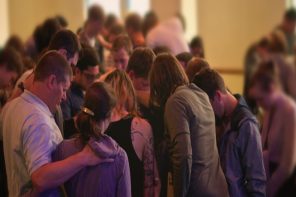“But one of the Twelve, Thomas, was not with them when Jesus came…” (John 20:26).
We have no record of where he was. We don’t know if he was caught in the marketplace or lingering at home. We aren’t privy to whether he was just moments away or whether he had decided not to join them altogether. We only know that Thomas was not there to see the risen Jesus.
All of us know the feeling of kicking yourself for missing something. Sometimes it’s as simple as going to sleep before the 4th quarter of a football game; other times it’s that you make the conscious choice to one place instead of another – maybe it’s staying at the office instead of being at the ball game or the dance recital – and then knowing immediately that you missed something big. Something important. Of second guessing yourself, over and over again, knowing that you could have made different scheduling choices to be where you ought to have been but you didn’t.
But this was not missing the opening few minutes of a play or walking in a few minutes late to a party. Thomas missed Jesus. And just as we don’t know why he wasn’t there, we don’t really know what was going on in his mind. We only know what he said: “If I don’t see the mark of his nails in His hands, put my finger into the mark of the nails, and put my hand into His side, I will never believe!” (John 20:25).
Were these words of insecurity? The same way that we might try and talk ourselves into believing that the thing we missed wasn’t actually the best party every or the most exciting football finish in history?
Were these words of anger? Aimed honestly as himself for his blunder in scheduling?
Were these words of sadness, redirected to verbalize a lack of faith, but more honestly expressing a deep sadness for his absence?
We don’t know. What we do know, though, is that these are definite words. They’re words of resolution: “I. Will. NEVER. Believe.” Thomas had made up his mind, and whether that was motivated by insecurity, anger, or sadness, he was resolute. He would not be caught up in the foolishness that was before him. I mean, come on – Jesus? Back from the dead? It was ridiculous after all. But here’s the striking thing to me about this passage.
Despite his definite claims, despite his resolution toward unbelief, despite his firm conviction to stand on proof rather than faith, Thomas kept showing up:
“After eight days His disciples were indoors again, and Thomas was with them…” (John 20:26).
This is the best thing that you and I can do when we, like Thomas, are feeling overcome with doubt. We keep showing up.
It’s a little surprising, don’t you think? If he was so full of doubt that he would make such a grand statement about his steadfast refusal to believe, that even eight days later he was still showing up? Yet there he was, still meeting with the disciples, and still feeling like an outsider. He was sitting with a group of people all of whom seemed to have this personal experience with Jesus, all of whom were convinced they had seen the risen Lord. Everyone but him. He alone held his doubts, and yet there he was.
Similarly, there are times when we wake up in the morning and question what we have believed. Is this whole thing really real? Are the stories really true? Am I really going to deny myself and everything the world has to offer today over this? And the doubts creep into the minds of even the most seasoned of believers. So what do we do then? What do we do when we, like Thomas, though we have every reason to believe, find ourselves hit in the face with the fact that we are basing our entire lives, and even eternity, on something that seems hilariously impossible?
We keep showing up.
True enough, on those days of doubt we might find ourselves sitting in the midst of God’s people, singing songs that we’re not sure we fully believe. Listening to words that seem to ring hollow in our hearts. Feeling devoid of the emotion that characterizes so many of those around us. And we might, for a time, feel as though we are the only one – on the outside looking in at a group of people with some common shared experience that at least in the moment seems to have faded in our own memory. But we are still there. Something inside us has compelled us to be with the people of Jesus.
We, too, keep showing up.
And as we do, we find that in showing up that memory is rekindled. As we sing together, our souls are lifted and our minds are put at ease. It’s not like a magic pill where you simply gather with God’s people and everything is okay again, but slowly, over time, we find that this same Jesus who we wondered whether was really dead or alive, reveals Himself to our cold hearts again, and we know that He has been there all along.
Don’t stop showing up, Christian. In fact, if you are doubting today, it’s the best time to show up again:
“After eight days His disciples were indoors again, and Thomas was with them. Even though the doors were locked, Jesus came and stood among them. he said, ‘Peace to you!’” (John 20:26).
Subscribe to MichaelKelley.co
Never miss a new post. Subscribe to receive these posts in your inbox and to receive information about new discipleship resources.




